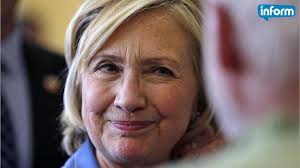GREENVILLE, S.C. (AP) — In her second bid for the presidency, Hillary Rodham Clinton is discussing “systemic racism” and making the issue a hallmark of her campaign, as she looks to connect with the black voters who supported rival Barack Obama in 2008.
At multiple stops in South Carolina this week, Clinton bemoaned “mass incarceration,” an uneven economy, increasingly segregated public schools and poisoned relations between law enforcement and the black community.
She praised South Carolina leaders, including Republican Gov. Nikki Haley, for removing the Confederate battle flag from statehouse grounds after a white gunman’s massacre of nine people at a historic black church in Charleston, but she warned that the act is only symbolic.
At both stops, she added symbolism of her own, trumpeting the mantra “Black Lives Matter” that has become a rallying cry of and name for activists who organized protests in several cities a mid high-profile cases of black citizens being killed during encounters with police.
“This is not just a slogan,” Clinton said. “This should be a guiding principle.”
The bold approach, which also includes previous addresses on voting rights and the criminal justice system, is a contrast to her 2008 campaign, when she didn’t talk so directly about race as she faced off against .
Obama, who would go on to become the nation’s first black president. Instead, she ran as the battle-tested, experienced counter to the first-term U.S. senator from Illinois.
Clinton doesn’t frame her unabashed commentary in a political context; aides repeatedly explain her strategy as “working to win every vote” and nothing more. Yet it’s clear that Clinton feels no constraints, as perhaps she did eight years ago.
It’s also no surprise that she prominently features the strategy in South Carolina. African-Americans make up about 28 percent of the population and a majority of the Democratic primary electorate, the first of the early-voting states to feature a significant bloc of black voters.
Obama trounced Clinton here in 2008, 56 percent to 27 percent, as many black voters flocked to his candidacy once he demonstrated white support in the Iowa caucuses and New Hampshire primary.
That leaves Clinton to reverse a bitter primary defeat, while using South Carolina as a test run for a potential general election in which she would need strong black support to reassemble Obama’s coalition in states like Virginia, Florida and Ohio.






